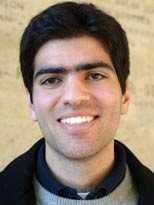Ali Alhassani, an MIT senior who discovered his passion for medicine and health policy through the friendship of a war-injured Iraqi boy, has been awarded a Marshall Scholarship for 2008.
Alhassani, a Boston native whose parents are Iraqi, is majoring in mechanical engineering with a minor in biomedical engineering and economics. As a Marshall Scholar, he will study health policy, planning and financing at the University of London's School of Hygiene and Tropical Medicine before attending medical school.
"I am excited about studying in the United Kingdom, and every day I am thankful for all of the opportunities MIT has provided for me in pursuing my academic and extracurricular interests," he said.
Ten years from now, Alhassani intends to be a practicing physician as well as an advocate for health policies both domestically and abroad, he said.
His plans for the future came into sharp focus in 2005, when he volunteered to serve as a translator for a 12-year-old boy wounded in Iraq and flown to Boston's Spaulding Hospital for urgent medical treatment.
Alhassani's frequent visits to the hospital inspired him to pursue a career in medicine and in advocacy for humanitarian aid, he told Linn Hobbs, professor of materials science and of nuclear engineering, and chair of the MIT Committee on Foreign Fellowships.
"Alhassani has a record of dedicated service aimed at fostering a better world through mutual understanding and personal ministration. With his impressive academic record and his genuine and diligent drive to help others, he is a rare young man," said Hobbs.
Ali's parents came to the United States from Iraq in order to pursue a better education. They have lived in the Boston area and in Morocco, and Alhassani continues to study Arabic at Harvard.
At MIT, Ali helped found Ascent, a Harvard and MIT student magazine about Islam and the West. He has worked as a research intern for the Accelerated Cure Project, a national nonprofit whose goal is to help find a cure for multiple sclerosis, and as a research assistant for Elazer Edelman, Thomas D. and Virginia W. Cabot Professor of Health Science and Technology, on angiogenesis and cardiac drug delivery. Last summer, he interned at the World Health Organization under the Assistant Director-General for Health Action in Crises, compiling crisis-analysis profiles. This semester he is co-leading a freshman seminar on AIDS in the 21st century.
Alhassani has also served as a Muslim leader for the Addir Fellowship, an interfaith group sponsored by the U.S. Department of Homeland Security, notes Kimberly Benard, program advisor for the Office of Study Abroad and Foreign Scholarships.
The Foreign Scholarships Committee comprises 17 members of the faculty, student body and academic staff, most of whom are former holders of Marshall, Rhodes, Fulbright and other major foreign scholarships or who administer MIT programs abroad. Additional information is available at web.mit.edu/scholarships.
Marshall Scholarships, first awarded in 1954, are named for Gen. George C. Marshall, architect of the European Recovery Act. The scholarships constitute Britain's official "thank you" for U.S. assistance following World War II. Forty scholarships are now awarded annually to U.S. citizens, tenable at any U.K. university.
A version of this article appeared in MIT Tech Talk on December 5, 2007 (download PDF).






